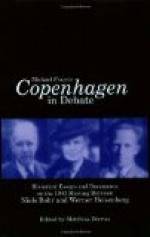|
This section contains 1,000 words (approx. 4 pages at 300 words per page) |

|
Encyclopedia of World Biography on Werner Karl Heisenberg
German physicist Werner Karl Heisenberg (1901-1976) was a pioneer in the formalization of atomic theory. He won the 1932 Nobel Prize in physics for his discovery of the uncertainty principle, which states that it is impossible to specify the precise position and momentum of a particle at the same time. Heisenberg also developed the theory of matrix mechanics. During World War II he was director of the German atomic bomb project, which led to his brief imprisonment following the war and some controversy during the remainder of his career.
Werner Karl Heisenberg was born on December 5, 1901, in Würzburg, Germany, the son of August and Annie Wecklein Heisenberg. He received his education at the Maximilian Gymnasium in Munich and at the University of Munich, where his father was professor of Greek language and literature. Shortly before he began his university studies, he worked on a farm for several...
|
This section contains 1,000 words (approx. 4 pages at 300 words per page) |

|


